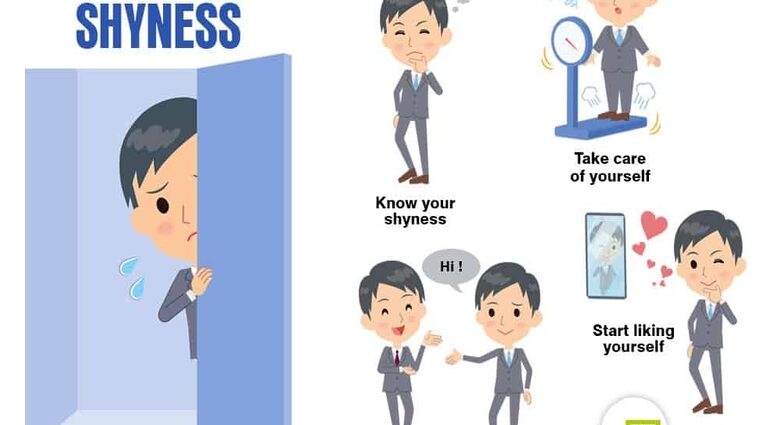Contents
Shyness
Symptoms of shyness
Tension and anxiety in response to apprehension of a potentially negative outcome (failure of oral delivery, negative judgment on new encounters) cause increased physiological arousal (high pulse, tremors, increased sweating) as well as subjective nervousness. The symptoms are similar to those of anxiety:
- feeling afraid of worry, panic, or discomfort
- heart palpitations
- sweating (sweaty hands, hot flashes, etc.)
- tremors
- shortness of breath, dry mouth
- feeling of suffocation
- chest pain
- nausea
- dizziness or lightheadedness
- tingling or numbness in the limbs
- sleeping troubles
- inability to respond adequately when the situation arises
- inhibitory behaviors during most social interactions
Often times, the anticipation of a social interaction is enough to trigger as many of these symptoms as when the interaction actually occurs.
Characteristics of the timid
Surprisingly, people easily identify as being shy. Between 30% and 40% of the Western population consider themselves shy, although only 24% of them are ready to ask for help for this.
Shy people have characteristics that are well documented scientifically.
- The shy person is endowed with a great sensitivity to evaluation and judgment by others. This explains why he fears social interactions, which are occasions to be evaluated negatively.
- The shy person has low self-esteem, which leads him to enter social situations with the impression that he will fail to act appropriately and meet the expectations of others.
- The disapproval of others is a very difficult experience which reinforces the shyness of the timid.
- Shy people tend to be very preoccupied, fixated on their thoughts: poor performance during the interaction, doubts about their ability to be up to par, the gap between their performance and what they would really like to show obsess them. About 85% of those who consider themselves shy admit to wondering too much about themselves.
- The timid are very critical individuals, including of themselves. They set very high goals for themselves and fear failure more than anything.
- Shy people speak less than others, have less eye contact (difficulty in looking others in the eyes) and have more nervous gestures. They de facto meet fewer people and have more difficulty making friends. By their own admission, they have communication problems.
Difficult situations for a shy person
The opportunities for meetings, conversations, meetings, speeches or interpersonal situations can be stressful for the timid. Social novelty as newness of role (such as assuming a new position following a promotion), unfamiliar or surprising situations can also lend themselves to this. For this reason, the timid prefer the usual, intimate, current situations.
The consequences of shyness
Being shy has many consequences, especially in the world of work:
- It leads to suffering failures on the romantic, social and professional levels
- To be loved less by others
- Causes a lot of difficulty in communicating
- Leads the shy person not to assert their rights, convictions and opinions
- Leads the shy person not to seek higher positions at work
- Causes contact problems with higher hierarchy people
- Leads the shy person not to be ambitious, to be underemployed and to remain unsuccessful in their job
- Results in limited career development
Inspirational quotes
« If you want to be loved a lot, a lot and often, be one-eyed, hunchbacked, lame, all at your ease, but don’t be shy. Shyness is contrary to love and it is an almost incurable evil ». Anatole France in Stendhal (1920)
« Shyness is more about self-esteem than modesty. The shy one knows his weak place and is afraid to let it be seen, a fool is never shy ». Auguste Guyard in Quintessences (1847)










